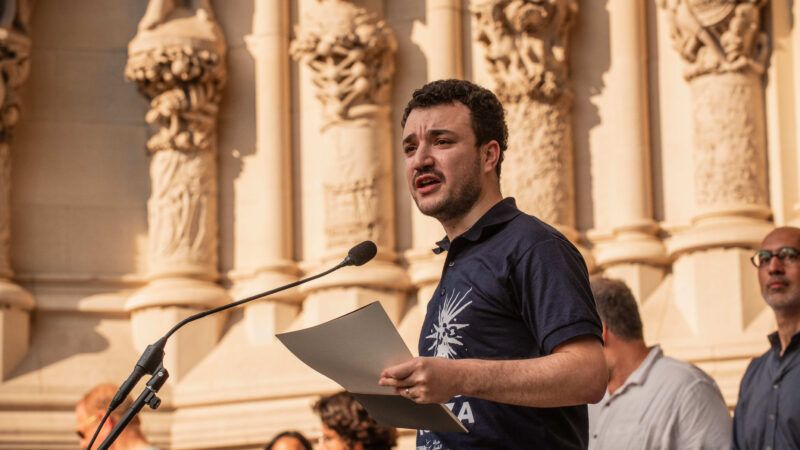The Rationale for Deporting Mahmoud Khalil Is Alarmingly Vague and Broad
Marco Rubio’s nebulous invocation of foreign policy interests is bound to have a chilling impact on freedom of speech, which is the whole point.

Mahmoud Khalil, the first target of President Donald Trump's crusade against international students he describes as "terrorist sympathizers," was released from custody on Friday after more than three months of detention. But the Trump administration is still trying to deport Khalil, a legal permanent resident, based on his participation in anti-Israel protests at Columbia University.
The official rationale for expelling Khalil is that he poses a threat to U.S. foreign policy interests. That justification is alarmingly broad and vague, raising due process and free speech concerns that interact with each other.
Khalil, a former Columbia graduate student, was arrested in Manhattan on March 8 and sent to an immigration detention facility in Louisiana. His arrest was based on 8 USC 1227, which authorizes the removal of noncitizens when the secretary of state "has reasonable ground to believe" their "presence or activities" in this country "would have potentially serious adverse foreign policy consequences for the United States."
In a two-page memo invoking Section 1227, Secretary of State Marco Rubio claimed Khalil had participated in "antisemitic protests" that "foster[ed] a hostile environment for Jewish students." Those activities, Rubio averred, "undermine U.S. policy to combat anti-Semitism around the world and in the United States" as well as "efforts to protect Jewish students from harassment and violence in the United States."
Rubio added that "condoning anti-Semitic conduct and disruptive protests in the United States would severely undermine" a "significant foreign policy objective." He nebulously described that objective as "champion[ing] core American interests and American citizens."
Rubio was alluding to Khalil's prominent role in protests at Columbia against Israel's war with Hamas in Gaza. But he did not cite any evidence that Khalil had promoted antisemitism—a charge that Khalil vehemently denies.
Nor did Rubio accuse Khalil of breaking the law. In fact, the memo acknowledged that the case against Khalil was based on "past, current, or expected beliefs, statements, or associations that are otherwise lawful."
Michael Farbiarz, the federal judge in New Jersey who last week ordered Khalil's release while his immigration case is pending, detailed the problems with that memo in a 101-page opinion on May 28. To begin with, Rubio repeatedly cited the purported domestic impact of Khalil's activism, which on its face had nothing to do with foreign policy.
Rubio also conspicuously failed to allege that Khalil's activism had affected U.S. relations with any particular country—the sort of concern that motivated the passage of Section 1227 in 1990 and has driven its enforcement ever since. And while prior uses of the law had focused on conduct in other countries, Farbiarz noted, Khalil "acted solely within the United States."
In short, Farbiarz concluded, "a Section 1227 removal of the kind at issue here is unprecedented—not within the realm of conduct that the statute normally covers, of which an ordinary person would have notice." Yet due process requires that people be given fair notice of which actions violate the government's rules.
The due process problem is compounded by the difficulty of anticipating what sort of conduct might be deemed to undermine the global fight against antisemitism and by the myriad other foreign policy interests that the secretary of state might invoke. Someone who "wishes to steer clear of the possibility of being removed from the United States under Section 1227," Farbiarz observed, will "have to go quiet, or he will have to figure these things out."
Rubio and Trump both have said they expect foreign students to choose the first option. That chilling effect raises obvious problems under the First Amendment, which the Supreme Court has said protects "aliens residing in this country" as well as U.S. citizens.
After Khalil's arrest, the Trump administration claimed he also was subject to removal because he did not provide all the information he should have when he applied for a green card. But that charge seems like a transparent cover for Khalil's real crime: expressing opinions that offend powerful people.
© Copyright 2025 by Creators Syndicate Inc.
